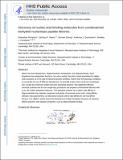Discovery of Nucleic Acid Binding Molecules from Combinatorial Biohybrid Nucleobase Peptide Libraries
Author(s)
Pomplun, Sebastian; Gates, Zachary P; Zhang, Genwei; Quartararo, Anthony J; Pentelute, Bradley L
DownloadAccepted version (2.144Mb)
Open Access Policy
Open Access Policy
Creative Commons Attribution-Noncommercial-Share Alike
Terms of use
Metadata
Show full item recordAbstract
© 2020 American Chemical Society. Nature has three biopolymers: oligonucleotides, polypeptides, and oligosaccharides. Each biopolymer has independent functions, but when needed, they form mixed assemblies for higher-order purposes, as in the case of ribosomal protein synthesis. Rather than forming large complexes to coordinate the role of different biopolymers, we dovetail protein amino acids and nucleobases into a single low molecular weight precision polyamide polymer. We established efficient chemical synthesis and de novo sequencing procedures and prepared combinatorial libraries with up to 100 million biohybrid molecules. This biohybrid material has a higher bulk affinity to oligonucleotides than peptides composed exclusively of canonical amino acids. Using affinity selection mass spectrometry, we discovered variants with a high affinity for pre-microRNA hairpins. Our platform points toward the development of high throughput discovery of sequence defined polymers with designer properties, such as oligonucleotide binding.
Date issued
2020-11Department
Massachusetts Institute of Technology. Department of Chemistry; Koch Institute for Integrative Cancer Research at MIT; Massachusetts Institute of Technology. Center for Environmental Health SciencesJournal
Journal of the American Chemical Society
Publisher
American Chemical Society (ACS)
Citation
Pomplun, Sebastian, Gates, Zachary P, Zhang, Genwei, Quartararo, Anthony J and Pentelute, Bradley L. 2020. "Discovery of Nucleic Acid Binding Molecules from Combinatorial Biohybrid Nucleobase Peptide Libraries." Journal of the American Chemical Society, 142 (46).
Version: Author's final manuscript
ISSN
0002-7863
1520-5126